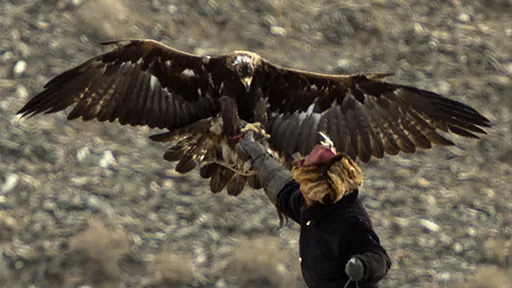Opinion Editorial Archive August, 2019: The Eagle Has Landed

Although Neil Armstrong will always be the most famous person to say the words, "the Eagle has landed," he wasn't the first. That would have been someone from one of the indigenous peoples of Central Asia. They have been getting eagles to land for thousands of years. Perhaps it was one of the ancient ancestors of the Kazakh man in this month's photo.
Although the Eagle landed on the moon fifty years ago last month, all of our combined powered flight experience, from the Wright brothers to the present day, does not even approach the combined non-powered flight experience of the indigenous peoples of Central Asia. It seems counter-intuitive, then, that powered flight was first achieved in the United States where eagles have played only a spiritual and ceremonial role for its indigenous peoples. We might expect powered flight to have been pioneered in Central Asia.
At a forum of technology experts last month, it was predicted that, by the time we're likely to return to the moon, fully ten percent of the global electricity supply will be used to power artificially intelligent devices. Yet all of that combined "intelligence" will not even approach the combined intelligence needed for this month's photo.
The Apollo space program was hugely successful, but it had its problems. While the Apollo 1 fire and loss of life is the foremost example, a lesser-known one relates to Apollo 8. On the journey home, Jim Lovell accidentally reset the guidance computer which then behaved (correctly) as though Apollo 8 had not yet even launched. Lovell was able to regain control and recover the situation but only in an on-the-spot, improvised way; otherwise the astronauts would have been lost. A member of the guidance computer team had previously alerted NASA management to the potential danger from this exact scenario. Their response was (I'm paraphrasing): there's no way on Earth an astronaut would make such a mistake. The irony, of course, is that, had it happened on Earth, the mistake would not have caused a problem.
Fifty-one years later we have still not learned the lesson from this Apollo 8 mistake. Indigenous people have been learning lessons from flight mistakes for at least a hundred times as long. Could we, perhaps, learn something from them? Taylah Griffin thinks so. She is a young, indigenous Gangulu woman from Australia and the first indigenous graduate with a Bachelor of Electrical and Aerospace Engineering degree from the Queensland University of Technology. Last month, she advocated for greater encouragement for indigenous people to enter the professional science and engineering community. Her employer, Boeing, is very busy at the moment. But Boeing will likely be part of the missions to land the next "Eagles." Large corporations seldom listen to their more junior employees, but I believe that Boeing would be well-advised to listen to what Taylah Griffin has to say.
Learn more about the Kazakh people.
If you enjoyed reading this month's opinion editorial, please consider supporting independent, advertising-free journalism by buying us a coffee to help us cover the cost of hosting our web site. Please click on the link or scan the QR code. Thanks!

